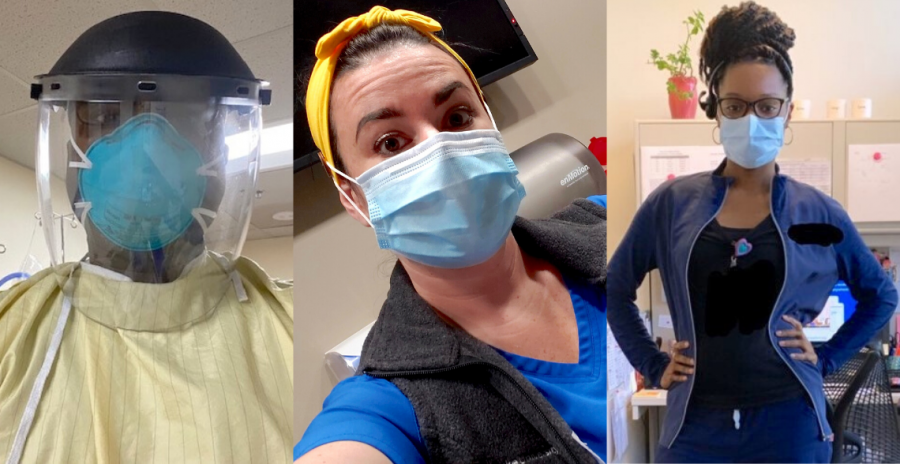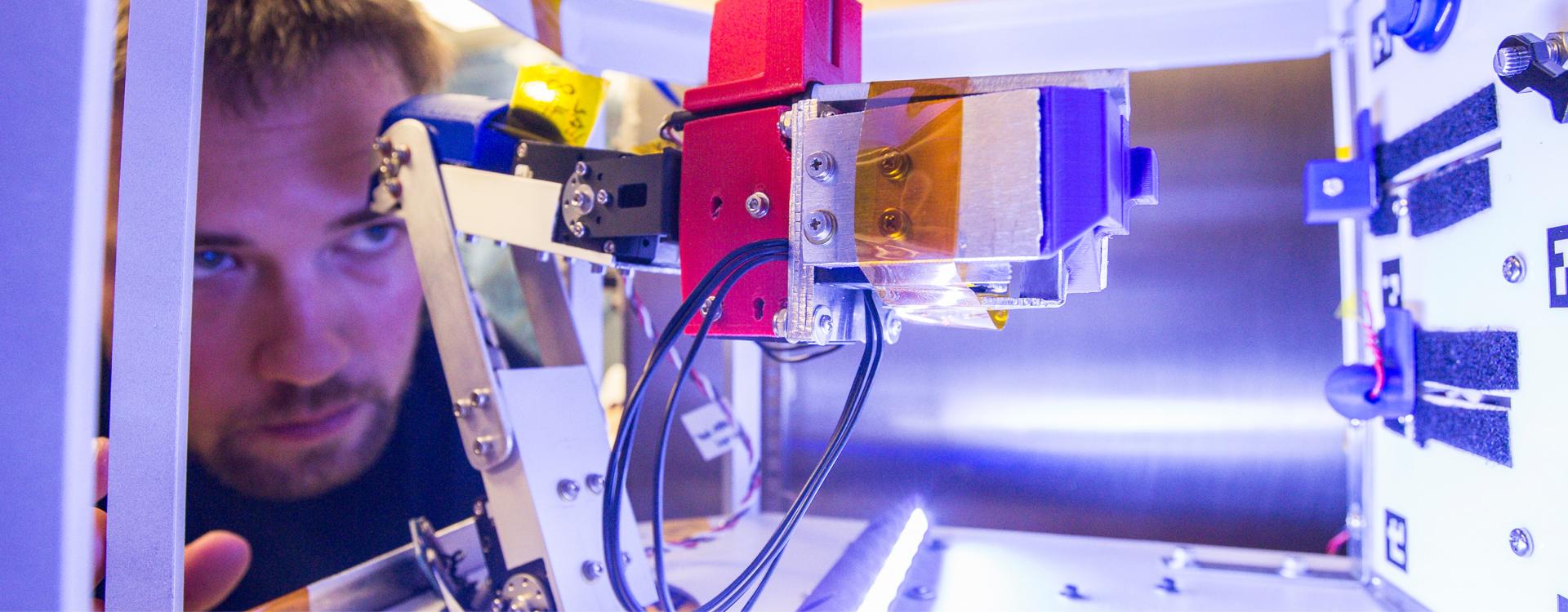Durham Tech graduates on the frontlines in fight against COVID-19, ‘toughest weeks of my life’

In hospitals and medical facilities across the Triangle, Durham Tech graduates are among the frontline healthcare workers fighting against COVID-19.
As the community college of the City of Medicine, Durham Tech has more than a dozen health technologies programs, providing the next generation of healthcare workers for hundreds of jobs each year.
Three Durham Tech graduates – Melanie Pinkney, Adonnis Thorpe, and Troy Cox – spoke about the challenging conditions and how Durham Tech helped them prepare for this moment. Pinkney and Thorpe are nurses and Cox is a respiratory therapist.
“The last eight weeks have been the toughest weeks of my life,” said Pinkney, a 2019 Associate Degree Nursing (ADN) graduate, now working in the Medical Intensive Care Unit – or MICU – at Duke University Hospital. “The MICU has been designated the primary unit of care for exposed and infected patients. We received the first rule out, the first positive, the first discharge, and the first death.”
Early March brought swift and concerning changes, the three alumni said. Hospital policies and procedures across the country became stricter, the use of personal protective equipment, or PPE, increased significantly, and visitors were no longer allowed in waiting rooms.
“When the hospital started screening employees coming into the hospital and restricting visitors, that’s when I knew this situation was different from our regular emergencies,” said Cox, a 2015 Respiratory Therapy graduate, now working at the Durham VA Medical Center. “The scariest thing about all of this is the uncertainty. The policies and procedures for dealing with this virus change daily, if not hourly.”
Pinkney said the first moment she realized COVID-19 was bigger than anyone imagined was when her unit began recycling PPE.
“Then our standard ARDS (Acute Respiratory Distress Syndrome) protocols were failing us," she said. "Then we started training nurses from other backgrounds that are being deployed to help our unit. We also began transforming our treatment rooms from single to double occupancy in preparation for what's likely to come.”
Thorpe, a 2019 Practical Nursing graduate, is now a triage nurse at Duke Primary Care, and never expected her first year to be so tumultuous.
“The last few weeks have been hectic in triage. My main focus is trying to keep patients calm when they arrive with potential COVID symptoms,” Thorpe said. “Keeping my stress level down has been a challenge because everyone around me is so tense. It’s scary, frustrating, and exciting all in one.”
The three graduates said while COVID-19 is in itself concerning – exposing it to their loved ones after a work shift is even more stressful. Healthcare workers are moms, dads, husbands, and wives, they reiterated.
“Exposing my family is my biggest fear and presents as an everlasting, palpable, churning ball of anxiety in my gut,” Pinkney said. “I’m very diligent with my PPE and hand hygiene at work. I change into new scrubs before leaving the hospital and bag the old set to wash. I have designated work shoes and a jacket that stay in the unit, and shower immediately when I get home. Hugs and kisses are limited.”
Cox is one of three healthcare workers in his family, which he said heightens his concerns of exposure. His wife is a nurse who works directly with COVID-19 positive patients and his daughter is an EMT.
“We all have a good probability of getting infected and exposing each other,” Cox said. “I have tried to stay away from our other three children, but I’m not sure that will be enough to keep them safe. I feel powerless to stop what is going to happen.”
The pandemic also has presented new work-life balance challenges.
“Balancing home, work, school, family, and friends has always been a challenge, but with so many variables in play right now, it has shifted considerably,” Pinkney said. “As a nurse, I feel compelled to work as much as I can to help my unit and my patients. We are all working at least one shift of overtime weekly, and mostly two. As a wife and mother, I feel responsible for the homeschooling, well-being, and sanity of my family while quarantined. As a friend, I feel distant because as I am unable to be close while directly exposed to COVID-19.”
Despite the imminent risk during a pandemic, they love what they do and have a passion for helping others.
“I wouldn’t trade this career for anything.” Thorpe said. “The days are stressful sometimes, but in the end, to be able to help someone stay calm or to even just get a thank you from a patient makes all the difference. I feel fortunate to be in a field that I care about.”
Pinkney said she feels a wide array of emotions about being on the frontlines.
“I feel honored to be trusted to care for your family; blessed to be a part of an elite team; confident the medical world will find suitable treatment; scared to be personally infected; anxious about bringing COVID-19 home to my husband and son; and worried for the world at large. Our bodies are physically sore and our mental health is being tested, but we are stronger together.”
Melissa Ockert, Dean of Health and Wellness at Durham Tech, said she is proud of all healthcare graduates during this unprecedented public health crisis.
“I am so humbled by what our students are doing to care for patients. These stories remind us that they are, in fact, heroes,” Ockert said. “I am so grateful to our incredible faculty that taught them to be ready for a moment just like this.”
A silver lining amidst the chaos has been the overwhelming support and appreciation the world has shown healthcare workers since the beginning of this crisis.
“What I enjoy most about being a nurse is the feeling of accomplishment and appreciation after that one ‘thank you’ from a family member or patient,” Pinkney said. “This unsolicited gratitude when you think no one is watching always seems to come right on time and rejuvenates my soul. It is in these moments I feel like I am right where I should be.”
They all said Durham Tech helped prepare them for challenges, even the unexpected ones.
“Durham Tech prepared me for almost everything that I’ve seen in my career,” Cox said. “The classroom instructors did a good job of mixing their personal experiences with the theoretical parts of respiratory care. I was taught that I would be the only one in an emergency that could do what I can do, and my instructors gave me the confidence to embrace that pressure.”
Pinkney said the lessons she learned at Durham Tech were invaluable, now more than ever.
“Durham Tech gave me the foundation to flourish in a critical care setting. I am now part of a well-oiled machine and led by a manager and team that always has our best interests at heart. We have endured test after test and tensions are rising, but I believe we will come out of this stronger and even more united.”
___________________________________________________________
Contact Marcy Gardner, Content and Social Media Coordinator, at gardnerm@durhamtech.edu

